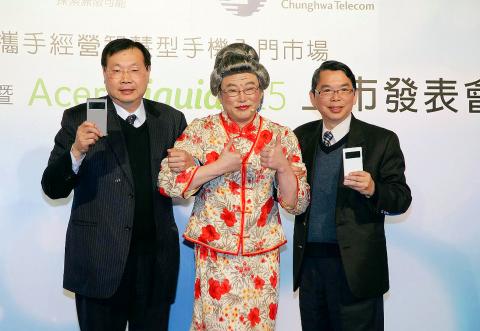Acer Inc (宏碁), the world’s fourth-largest PC maker, yesterday said it plans to launch wearable devices later this year, jumping on the bandwagon of popular mobile devices.
“We actually had demonstrated our products [wearable devices] to some of the company’s clients at the Consumer Electronics Show earlier this month,” said Peter Shieh (謝金全), vice president of Acer’s corporate account business division under the company’s Greater China regional operation department.
“The company is still developing certain types of wearable devices. We certainly aim to play a role in the new market,” he told reporters on the sidelines of a product launch event.

Photo: CNA
He did not said if the wearable products would include smart watches. In collaboration with telecom carrier Chunghwa Telecom Co (中華電信), Acer yesterday launched its new smartphone product, called the Liquid Z5, in Taipei. The new smartphone runs on Google Inc’s Android 4.2 Jelly Bean mobile operating platform and is equipped with MediaTek Inc’s (聯發科) MT 6572 1.3 GHz dual-core processor, a 5-inch display and 5 megapixel camera.
Shieh said Acer also planned to launch smartphones supporting 4G this year to meet consumers’ needs for faster wireless data transmission. He added that Acer will consider collaborating with the nations’ top three telecom carriers — Chunghwa Telecom, Taiwan Mobile Co (台灣大哥大) and Far EasTone Telecommunications Co (遠傳電信) — to help boost sales of its smartphones this year. Acer plans to sell between 140,000 and 175,000 smartphones in the home market this year, Shieh said.
That is between 100 percent and 150 percent more than 70,000 units of smartphones Acer sold in Taiwan last year, he added.
According to Acer’s internal financial report, up to 90 percent of the company’s smartphone sales were generated from telecom carriers’ purchases last year, Shieh said, forecasting that the percentage would remain the same this year.
“Given telecom carriers’ extensive sales channels, Acer has to collaborate with operators to sell its smartphone products in Taiwan and other countries as well,” Fubon Securities Co (富邦證券) analyst Ange Wu (吳淵傑) said by telephone.
Wu said Acer, like its largest domestic rival, Asustek Computer Inc (華碩), can make profits of between 20 and 30 percent of each smartphone’s sales price by selling smartphones to telecom carriers.
However, unlike China’s Lenovo Group (聯想), the world’s biggest PC maker, Acer has to differentiate its products from others and build strong brand loyalty to stay competitive in the smartphone market because “Lenovo has a huge home market that Acer lacks,” Wu said.
Separately, in a filing to the Taiwan Stock Exchange, Acer yesterday said its former chairman and chief executive officer Wang Jeng-tang (王振堂) had resigned from the company’s board of directors before his term was to end in June.

Intel Corp chief executive officer Lip-Bu Tan (陳立武) is expected to meet with Taiwanese suppliers next month in conjunction with the opening of the Computex Taipei trade show, supply chain sources said on Monday. The visit, the first for Tan to Taiwan since assuming his new post last month, would be aimed at enhancing Intel’s ties with suppliers in Taiwan as he attempts to help turn around the struggling US chipmaker, the sources said. Tan is to hold a banquet to celebrate Intel’s 40-year presence in Taiwan before Computex opens on May 20 and invite dozens of Taiwanese suppliers to exchange views

Application-specific integrated circuit designer Faraday Technology Corp (智原) yesterday said that although revenue this quarter would decline 30 percent from last quarter, it retained its full-year forecast of revenue growth of 100 percent. The company attributed the quarterly drop to a slowdown in customers’ production of chips using Faraday’s advanced packaging technology. The company is still confident about its revenue growth this year, given its strong “design-win” — or the projects it won to help customers design their chips, Faraday president Steve Wang (王國雍) told an online earnings conference. “The design-win this year is better than we expected. We believe we will win

Chizuko Kimura has become the first female sushi chef in the world to win a Michelin star, fulfilling a promise she made to her dying husband to continue his legacy. The 54-year-old Japanese chef regained the Michelin star her late husband, Shunei Kimura, won three years ago for their Sushi Shunei restaurant in Paris. For Shunei Kimura, the star was a dream come true. However, the joy was short-lived. He died from cancer just three months later in June 2022. He was 65. The following year, the restaurant in the heart of Montmartre lost its star rating. Chizuko Kimura insisted that the new star is still down

While China’s leaders use their economic and political might to fight US President Donald Trump’s trade war “to the end,” its army of social media soldiers are embarking on a more humorous campaign online. Trump’s tariff blitz has seen Washington and Beijing impose eye-watering duties on imports from the other, fanning a standoff between the economic superpowers that has sparked global recession fears and sent markets into a tailspin. Trump says his policy is a response to years of being “ripped off” by other countries and aims to bring manufacturing to the US, forcing companies to employ US workers. However, China’s online warriors